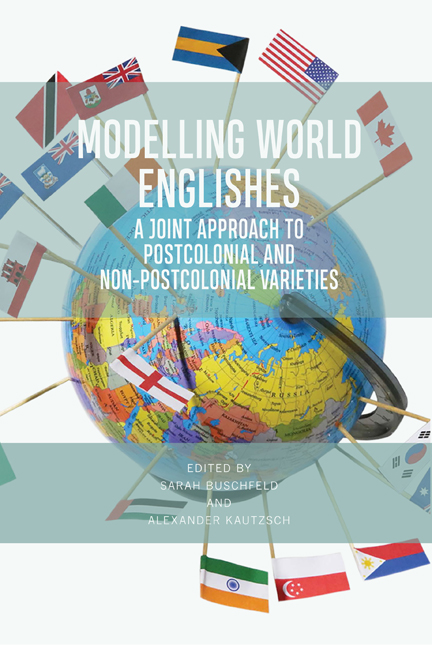Book contents
- Frontmatter
- Contents
- List of Figures and Tables
- List of Contributors
- Foreword
- 1 Introduction
- 2 English in England: The Parent Perspective
- 3 English in Namibia: Multilingualism and Ethnic Variation in the Extra- and Intra-territorial Forces Model
- 4 English in the United Arab Emirates: Status and Functions
- 5 English in India: Global Aspirations, Local Identities at the Grassroots
- 6 English in Singapore: Two Issues for the EIF Model
- 7 English in the Philippines: A Case of Rootedness and Routedness
- 8 English in South Korea: Applying the EIF Model
- 9 English in Japan: The Applicability of the EIF Model
- 10 English in Australia – Extra-territorial Influences
- 11 English in North America: Accounting for its Evolution
- 12 English in The Bahamas and Developmental Models of World Englishes: A Critical Analysis
- 13 Standard English in Trinidad: Multinormativity, Translocality, and Implications for the Dynamic Model and the EIF Model
- 14 Englishes in Tristan da Cunha, St Helena, Bermuda and the Falkland Islands: PCE, non-PCE or both? Blurred Boundaries in the Atlantic
- 15 English in Ireland: Intra-territorial Perspectives on Language Contact
- 16 English in Gibraltar: Applying the EIF Model to English in Non-Postcolonial Overseas Territories
- 17 English in Ghana: Extra- and Intra-territorial Forces in a Developmental Perspective
- 18 Synopsis: Fine-tuning the EIF Model
- Index
7 - English in the Philippines: A Case of Rootedness and Routedness
Published online by Cambridge University Press: 24 September 2020
- Frontmatter
- Contents
- List of Figures and Tables
- List of Contributors
- Foreword
- 1 Introduction
- 2 English in England: The Parent Perspective
- 3 English in Namibia: Multilingualism and Ethnic Variation in the Extra- and Intra-territorial Forces Model
- 4 English in the United Arab Emirates: Status and Functions
- 5 English in India: Global Aspirations, Local Identities at the Grassroots
- 6 English in Singapore: Two Issues for the EIF Model
- 7 English in the Philippines: A Case of Rootedness and Routedness
- 8 English in South Korea: Applying the EIF Model
- 9 English in Japan: The Applicability of the EIF Model
- 10 English in Australia – Extra-territorial Influences
- 11 English in North America: Accounting for its Evolution
- 12 English in The Bahamas and Developmental Models of World Englishes: A Critical Analysis
- 13 Standard English in Trinidad: Multinormativity, Translocality, and Implications for the Dynamic Model and the EIF Model
- 14 Englishes in Tristan da Cunha, St Helena, Bermuda and the Falkland Islands: PCE, non-PCE or both? Blurred Boundaries in the Atlantic
- 15 English in Ireland: Intra-territorial Perspectives on Language Contact
- 16 English in Gibraltar: Applying the EIF Model to English in Non-Postcolonial Overseas Territories
- 17 English in Ghana: Extra- and Intra-territorial Forces in a Developmental Perspective
- 18 Synopsis: Fine-tuning the EIF Model
- Index
Summary
INTRODUCTION
While English in the Philippine context is a widely documented and studied area, it remains a curious case conflated with issues of socioeconomic mobility, politics, and ethnicity among others. This chapter takes the position that an understanding of English in the Philippines necessitates more than just the description or codification of what has often been asserted as a clear-cut national variety, a Philippine English. To capture the fragmented sociolinguistic reality of the country, I take into consideration the existence of dynamic language practices attributed to various factors including but not limited to regional differences. Enlightened by Buschfeld and Kautzsch's (2017) contention that the development of Englishes, both in postcolonial and non-postcolonial contexts, is influenced by extra- and intra- territorial forces, I look into the dynamic make-up of the country's sociolinguistic soil, one which has been and continues to be configured by past and present forces; namely, its history of colonization and its present postcolonial situation, deep-seated ethnic tensions, and the globalizing movement. While there is much to be explored in an archipelagic country of 7,107 islands, my focus will be on the Cebuano context, specifically in identified online spaces where speakers negotiate their regional identity while seeking to connect and build networks in a global environment. Extra and intraterritorial forces, such as those mentioned above, create a fertile ground for the languaging dubbed as Bislish (Bisaya + English), an instance of what Schneider (2016: 341) refers to as unfixed hybrid forms that emerge from a contact between English and another language.
Like the extensively documented mixed variety called Taglish (Schneider 2016: 345; Thompson 2003: 40–41), Bislish is an unmarked behavior in various domains including media, education, and informal talk. Unlike Taglish, however, Bislish has a regional dimension worth looking into. It is prominent among speakers whose language practices may be affected, if not defined, by (1) their underlying collective resistance to Tagalog as the national language and (2) their strong affinity with English as the language of social and economic mobility in a globalizing world.
I argue that Bislish is propelled by the extra- and intra-territorial forces; namely, history, politics, and globalization.
- Type
- Chapter
- Information
- Modelling World EnglishesA Joint Approach to Postcolonial and Non-Postcolonial Varieties, pp. 133 - 153Publisher: Edinburgh University PressPrint publication year: 2020



